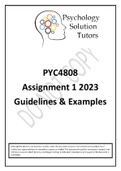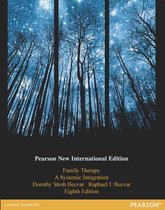PYC4808
Assignment 1 2023
Guidelines & Examples
, This document contains:
• Marking rubric for assignment 1.
• Examples of 4 posters (all 4 achieved a mark more than 90%) – to be used as guidelines – NOT TO
BE COPIED!
• Lecturer feedback on marked poster.
• References.
This document is to be used as guidelines when compiling your own work – do not copy information.
Assignment 1 - Unique assignment number 886939 (Due date 17 May 2023)
This assignment is an individual assignment, that aims to explore your understanding of the
different knowledge systems, and how they are integrated into this module. In other words, we are
exploring the different paradigms and related aspects of ecosystemic psychology that informs the way we
think.
For assignment 1 - you are required to create a poster that both differentiates between and
integrates the different knowledge systems. Your poster should demonstrate your understanding of the
content, but also your understanding of which paradigms are linked / integrated into certain aspects of
Ecosystemic Psychology.
In order to complete his assignment you should be knowledge about modernism and
postmodernism, the underlying premises of first order and second order cybernetics, and African
knowledge systems. In your poster, include the modernist and postmodernist approaches, first and
second order cybernetics, as well as African, or indigenous knowledge systems. However, your poster
should not include only academic and theoretical concepts, but also personalised and relational concepts
(this can be done in the form of pictures, words, phrases, idioms, metaphors, etc).
Prescribed reading for assignment 1:
Becvar & Becvar (2014) – chapters 1, 3 and 4
Nwoye, A. (2015). African Psychology and the Africentric paradigm to clinical diagnosis and treatment.
South African Journal of Psychology, 45(3), 305–317.
Nwoye, A. (2017). An Africentric theory of human personhood. PINS, 54, 42–66. doi.org/10.17159/2309-
8708/2017/n54a4
Recommended Reading:
Mkhize, N & Ndimande-Hlongwa, N. (2014). African languages, Indigenous Knowledge Systems (IKS), and
the transformation of the humanities and social sciences in higher education. Alternation, 21(2), 1023–
1757.





